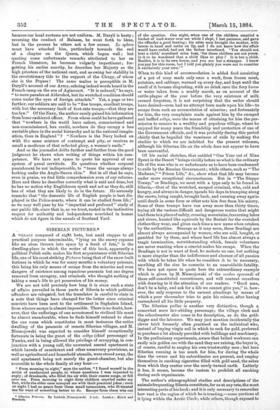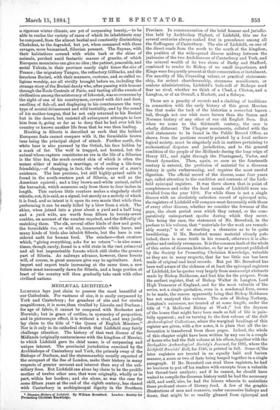SIBERIAN PICTURES.*
A VILLAGE composed of eight huts, lost amid steppes to all practical purpose interminable, "lying on the snowy expanse like an atom thrown into space by a freak of fate," is the dwelling-place in which the writer of this book, apparently a political Polish exile, makes his first acquaintance with Siberian life, one of his most striking Pictures being that of the snow-built
fortress in which he was for many months a voluntary prisoner;
-this being his only means of escape from the miseries and even dangers of existence among rapacious peasants but one degree removed from savagery, and criminals who thought nothing of
taking a man's life to get possession of his money.
We are not told precisely how long it is since such a state of affairs prevailed in those parts of Siberia to which political -offenders are relegated, but the translator is careful to state in a note that things have changed for the better since criminal convicts have been sent to the settlement in Saghalein Island, from whence escape is almost impossible. There is no doubt, how- ever, that the sufferings of one accustomed to civilised life must be almost unendurable, when he finds himself reduced to share the one room which constitutes in most instances the entire -dwelling of the peasants of remote Siberian villages, and M.
Niemojowski was expected to consider himself exceptionally fortunate in being the guest of the soltys (chief personage) of Yamka, and in being allowed the privilege of occupying, in con- junction with a young calf, the unwonted second apartment in which barrels of sauerkraut and other unsavoury provisions, as
well as agricultural and household utensils, were stored away, the said apartment being not merely the guest-chamber, but also accessible to the whole family at any hour :—
" From morning to night," says the author, "I found myself in the midst of uneducated people, to whose questions I was expected to reply ; of drunkards, who filled the air with their coarse songs, or fell over me. From morning to night dirty children crawled under my feet, while the elder ones annoyed me with their practical jokes ; even at night I had no peace from these small tormentors, who ill-treated me for want of something better to do. Escape'from them was out • Siberian Pictures. By Ludwa :Niemojowski. 2 vols. London: Harst and Blsakett.
of the question. One night, when one of the children emptied a bucket of iced-water over me while I slept, I lost patience, and gave the offender a good beating; his cries soon brought the mother, with broom in hand and oaths on lip, and I do not know how the affair would have ended, had not the father interfered. ' Yon should not beat a child,' moralised mine host, 'for these children are not yours. Is it to be wondered that a child likes to play ? It is but a child. Besides, it is in its own house, and you are but a stranger. I know you pay for this room, but I told you plainly you were not to consider it exclusively your own.' "
When to this kind of accommodation, is added food consisting of a pot of soup made only once a week, from frozen meat, potatoes, and cabbage, warmed up every day, and kept until the smell of it became disgusting, with no drink save the fiery kwas, or water taken from a muddy marsh, as on account of the cattle-plague of the year before the very existence of milk. seemed forgotten, it is not surprising that the writer should
have desired—even had no attempt been made upon his life—to escape from such an accumulation of miseries ; and fortunately
for him, the very complaints made against him by the enraged and baffled soltys, were the means of obtaining for him the- per- mission to remove to a wealthy and populous village, where he enjoyed for many years the friendship and protection of one of the Government officials, and it was probably during this period chiefly that he beguiled the weariness of exile by making the
studies to which we are indebted . for the present volumes, although his Siberian life on the whole does not appear to have been uneventful.
Of his social sketches, that entitled "One Year out of Nine Spent in the Desert " brings vividly before us what is the ordinary life of the man who is so unfortunate as to have been condemned to exile by the Russian Government ; while others, such as " The Madman," "Prison Life," &c., show what that life may become under more exceptional circumstances. Bnt in " The Steppe Tramp," or Bradiaga, we meet.with a type only to be found in Siberia,—that of the wretched, escaped criminal, who, cold and hungry, and always in danger,'spends his days in tramping along the snows, being caught, brought back, and running away again, until death in some form or other sets him free from his misery.
Some of these tramps have run away more than thirty times, trying all the various difficult and dangerous routes that might lead them to a place of safety, crossing mountains, traversing lakes and rivers, hunted like squirrels by the Buriati for the Wretched clothes they wear, and given each time a new name when retaken by the authorities. Strange as it may seem, these Bradiagi are almost always accompanied by women, who are sold, bought, or
gambled for by them, and whose hard life has almost always a tragic termination, notwithstanding which, female volunteers are never wanting when a convict makes his escape. When the Bradiaga is not in want of food, he molests no one, but nothing is more singular than the indifference and absence of all passion
with which he takes life when he considers it to be necessary, ascribing all the sins he commits to an unavoidable fatality. We have not space to quote here the extraordinary example
which is given by M. Niemojowski of the modus operandi of these self-constituted executioners, and will content ourselves
with drawing to it the attention of our readers. " Good man, don't be a baby, and ask for a life we cannot give you," is, how- ever, the only response to the earnest pleadings by means of which' a poor shoemaker tries to gain his release, after having surrendered all his little property.
The Siberian pedlar is another very distinctive, though a somewhat more law-abiding personage; the village clerk and the schoolmaster also come in for description, as do the gold- digger and the labourer. We may just mention incidentally the clever trick formerly often practised on the individual who, instead of buying virgin soil in which to seek for gold, preferred to purchase a lot already provided with buildings and machinery. In the preliminary experiments, aware that bribed workmen can easily mix golden ore with the sand they are raising, the buyer is, of course, careful to employ his own trustworthy men ; but here Siberian cunning is too much for him, for during the whole time the owner and his subordinates are present, and employ themselves in smoking cigarettes filled with gold sand, the ashes from which they scatter over the newly-turned earth. Latterly it has, it seems, become the 'custom to prohibit all smoking during such experiments.
The author's ethnographical studies and descriptions of the animals frequenting Siberia constitute, for us at any rate, the most interesting parts of his book; and it is only necessary to remember how vast is the region of which be is treating,—some portions of it lying within the Arctic Circle, while others, though exposed to
a rigorous winter climate, are yet of surpassing beauty,—to be -able to realise the variety of races of which its inhabitants may be composed, from the almost bestial and constantly diminishing Chukchae, to the degraded, but yet, when compared with these savages, more humanised, Siberian peasant. The Sayan, with their habitations covered with white bark or the skins of animals, perched amid fantastic masses of granite, of which European mountains can give no idea ; the patient, peaceable, and social Yakuts, in their province nearly eight times the size of France ; the migratory Tungaz, the refmctory.Gilliacks, and the ferocious Buriati, with their manners, customs, and so-called re- ligious worship, are all vividly brought before us, including the strange story of the Buriati dandy who, after passing with honour through the Ecole Centrale of Paris, and tasting all the sweets of civilisation among the aristocracy of Irkoutsk, was so overcome by the sight of one of his countrymen, covered with dirt and dust, smelling of fish-oil, and displaying in his countenance the very type of mental debasement and wild bestiality, and by the sound -of his mother-tongue, that he not only returned to his Buriati but in the desert, but resisted all subsequent attempts to lure him from it, going so far as to deny that he had ever left his country or known another life from that he was then leading.
Hunting in Siberia is described as such that the boldest European feats cannot compare with it, the formidable brown bear being the principal object of attack. Further north, the white bear is also pursued by the Ostiak, his face hidden by a mask -of fur. The wolf is trapped, not hunted, but the animal whose capture constitutes an era in the life of a Siberian is the blue fox, the much coveted skin of which is often the means either of making a marriage, or of ending a life-long friendship,—of changing, in fact, the whole course of a man's existence. The less precious, but still highly-prized sable is found in the south-western part of Siberia, as well as the American squirrel ; and a tiny brown-and-white animal, called the buranduk, which measures only from three to four inches in length. This curious little creature makes a singularly shrill whistle, not, it is said, as a signal, but merely as a melody of which it is fond, and so intent is it upon its own music that while thus performing it can be easily killed by a blow from a stick. The skins, when joined into a piece about a yard and a half long and a yard wide, are worth from fifteen to twenty-seven roubles, on account of the number required, and the difficulty of matching them. The elk, several other kinds of deer and goats, the formidable tur, or wild ox, innumerable white hares, and many kinds of birds also inhabit Siberia, but the hare is con- sidered unfit for human food. The reindeer—that creature which, " giving everything, asks for no return "—is also some- times; though rarely, found in a wild state in the vast primaeval and all but impenetrable forests which still clothe the greater part of Siberia. As railways advance, however, these forests will, of course, in great measure give way to agriculture. And, import and export trade increasing at the same time, a new future must necessarily dawn for Siberia, and a large portion at least of the country will then gradually take rank with other civilised nations.



































 Previous page
Previous page